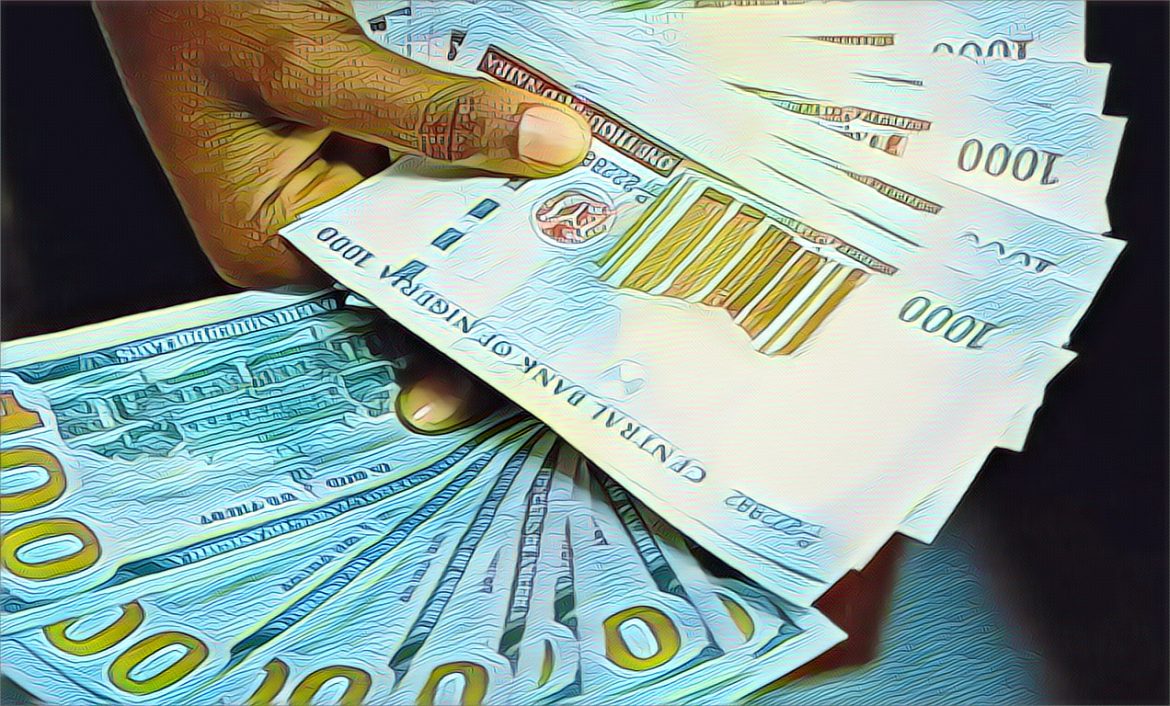The Nigerian naira has staged a remarkable recovery against the US dollar in the past week, thanks to a series of policy measures by the Central Bank of Nigeria (CBN) aimed at stabilizing the foreign exchange market.
The naira appreciated by 4.49 percent to close at N1,418.78 per dollar on Wednesday, February 7, 2024, at the Nigerian Autonomous Foreign Exchange Market (NAFEM), data from the FMDQ showed. This was a significant improvement from N1,482.57 per dollar on January 30, 2024, when the naira hit a record low.
The naira also gained some ground at the parallel market, also known as the black market, where it traded for N1,490 per dollar on Wednesday, compared to N1,480 on Tuesday, according to data collated from various street trading platforms.
The naira’s rally came after the CBN announced a new strategy to enhance liquidity and efficiency in the FX market, following months of pressure from dwindling oil revenues, rising inflation, and increased demand for foreign currency.
The CBN’s new strategy includes unifying the FX market segments, clearing outstanding FX obligations, introducing new operational mechanisms for Bureau De Change (BDC) operators, enforcing the Net Open Position limit, and adjusting the remunerable Standing Deposit Facility cap.
The CBN also said it would shift to a market-driven exchange rate regime, in line with the directive of the Tinubu administration, which took over power in May 2023. The move was intended to create a stable macroeconomic environment and discourage currency hoarding and speculation.
The CBN’s governor, Yemi Cardoso, explained the rationale behind the new strategy during a sectoral debate by the House of Representatives on Wednesday.
“The Nigerian foreign exchange market is currently facing increased demand pressures, causing a continuous decline in the value of the naira,” Cardoso said.
He said the factors contributing to this situation include speculative forex demand, inadequate forex supply due to the non-remittance of crude oil earnings to the CBN, increased capital outflows, and excess liquidity from fiscal activities.
He said the exchange rate is determined by the dynamics of supply and demand for a product or service, and that the value of the US dollar in Nigeria is determined by the balance of US dollars entering the country and the demand for US dollars among Nigerians.
He noted that in the 1980s and 1990s, the need for US dollars for their living expenses was minimal. However, recent data shows a significant change.
According to UNESCO’s Institute of Statistics, the number of Nigerian students abroad increased from less than 15,000 in 1998 to over 71,000 in 2015. By 2018, this figure had reached 96,702 students, as per the World Bank. Another report projects the number of Nigerian students studying abroad to exceed 100,000 by 2022. Additionally, the UK’s Higher Education Statistic Agency noted a 64 percent increase in Nigerian students studying in the country, rising from 13,020 in the 2019/2020 academic session to 21,305 by the 2020/2021 session.
“My team and I are dedicated to refocusing the Bank by giving primacy to price stability. We also aim to build confidence in the Nigerian economy through the maintenance of stability in consumer prices and the foreign exchange market,” Cardoso said.
The naira’s performance has also been boosted by the increase in oil prices, which rose to $75 per barrel on Wednesday, the highest level since October 2018. Nigeria, Africa’s largest oil producer, relies on oil exports for about 90 percent of its foreign exchange earnings and 60 percent of its government revenue.
Analysts have welcomed the CBN’s new strategy, saying it could help restore confidence and attract more foreign investment into the country.
“The CBN’s move is a positive step towards addressing the structural imbalances in the FX market and creating a more transparent and efficient system. This could improve the naira’s outlook and reduce the risk of further depreciation,” said Chidi Okoroafor, an economist and lecturer at the University of Lagos.
He added that the CBN should also focus on boosting the country’s productive capacity and diversifying the economy away from oil dependence, to reduce the pressure on the naira and enhance its resilience.
The CBN has assured the public that it has enough foreign reserves to meet the legitimate demand for foreign exchange and that it will continue to monitor the market and intervene as necessary to ensure stability and order.
The naira’s recovery is expected to ease the burden of inflation, which stood at 18.3 percent in December 2023, the highest in four years. It could also improve the purchasing power of Nigerians and boost their living standards.
Source: Business Day


